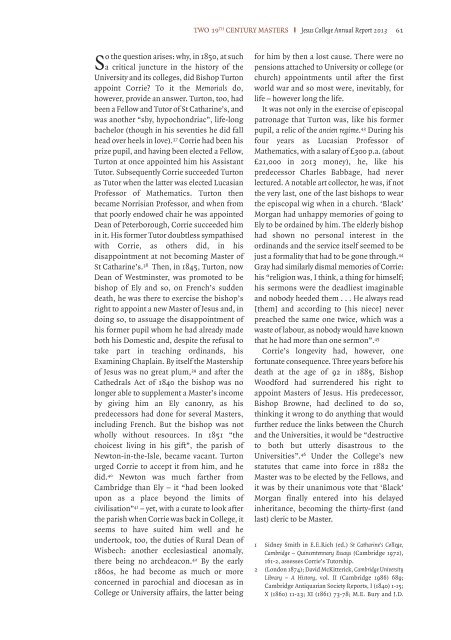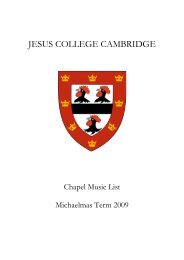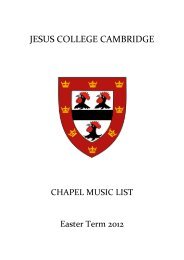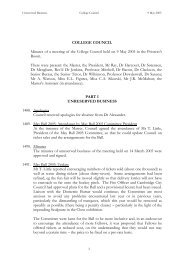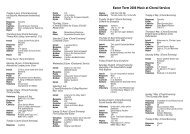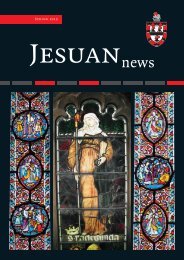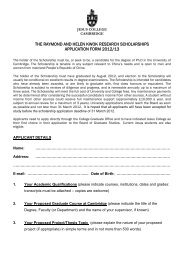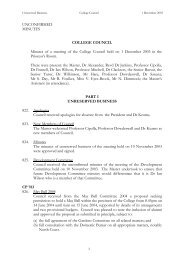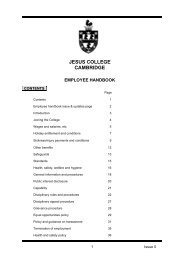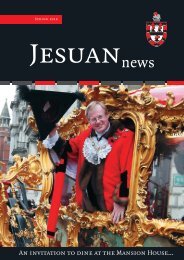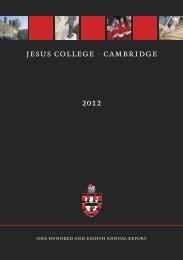2013 Annual Report - Jesus College - University of Cambridge
2013 Annual Report - Jesus College - University of Cambridge
2013 Annual Report - Jesus College - University of Cambridge
You also want an ePaper? Increase the reach of your titles
YUMPU automatically turns print PDFs into web optimized ePapers that Google loves.
TWO 19 TH CENTURY MASTERS I <strong>Jesus</strong> <strong>College</strong> <strong>Annual</strong> <strong>Report</strong> <strong>2013</strong> 61<br />
So the question arises: why, in 1850, at such<br />
a critical juncture in the history <strong>of</strong> the<br />
<strong>University</strong> and its colleges, did Bishop Turton<br />
appoint Corrie? To it the Memorials do,<br />
however, provide an answer. Turton, too, had<br />
been a Fellow and Tutor <strong>of</strong> St Catharine’s, and<br />
was another “shy, hypochondriac”, life-long<br />
bachelor (though in his seventies he did fall<br />
head over heels in love). 37 Corrie had been his<br />
prize pupil, and having been elected a Fellow,<br />
Turton at once appointed him his Assistant<br />
Tutor. Subsequently Corrie succeeded Turton<br />
as Tutor when the latter was elected Lucasian<br />
Pr<strong>of</strong>essor <strong>of</strong> Mathematics. Turton then<br />
became Norrisian Pr<strong>of</strong>essor, and when from<br />
that poorly endowed chair he was appointed<br />
Dean <strong>of</strong> Peterborough, Corrie succeeded him<br />
in it. His former Tutor doubtless sympathised<br />
with Corrie, as others did, in his<br />
disappointment at not becoming Master <strong>of</strong><br />
St Catharine’s. 38 Then, in 1845, Turton, now<br />
Dean <strong>of</strong> Westminster, was promoted to be<br />
bishop <strong>of</strong> Ely and so, on French’s sudden<br />
death, he was there to exercise the bishop’s<br />
right to appoint a new Master <strong>of</strong> <strong>Jesus</strong> and, in<br />
doing so, to assuage the disappointment <strong>of</strong><br />
his former pupil whom he had already made<br />
both his Domestic and, despite the refusal to<br />
take part in teaching ordinands, his<br />
Examining Chaplain. By itself the Mastership<br />
<strong>of</strong> <strong>Jesus</strong> was no great plum, 39 and after the<br />
Cathedrals Act <strong>of</strong> 1840 the bishop was no<br />
longer able to supplement a Master’s income<br />
by giving him an Ely canonry, as his<br />
predecessors had done for several Masters,<br />
including French. But the bishop was not<br />
wholly without resources. In 1851 “the<br />
choicest living in his gift”, the parish <strong>of</strong><br />
Newton-in-the-Isle, became vacant. Turton<br />
urged Corrie to accept it from him, and he<br />
did. 40 Newton was much farther from<br />
<strong>Cambridge</strong> than Ely – it “had been looked<br />
upon as a place beyond the limits <strong>of</strong><br />
civilisation” 41 – yet, with a curate to look after<br />
the parish when Corrie was back in <strong>College</strong>, it<br />
seems to have suited him well and he<br />
undertook, too, the duties <strong>of</strong> Rural Dean <strong>of</strong><br />
Wisbech: another ecclesiastical anomaly,<br />
there being no archdeacon. 42 By the early<br />
1860s, he had become as much or more<br />
concerned in parochial and diocesan as in<br />
<strong>College</strong> or <strong>University</strong> affairs, the latter being<br />
for him by then a lost cause. There were no<br />
pensions attached to <strong>University</strong> or college (or<br />
church) appointments until after the first<br />
world war and so most were, inevitably, for<br />
life – however long the life.<br />
It was not only in the exercise <strong>of</strong> episcopal<br />
patronage that Turton was, like his former<br />
pupil, a relic <strong>of</strong> the ancien regime. 43 During his<br />
four years as Lucasian Pr<strong>of</strong>essor <strong>of</strong><br />
Mathematics, with a salary <strong>of</strong> £300 p.a. (about<br />
£21,000 in <strong>2013</strong> money), he, like his<br />
predecessor Charles Babbage, had never<br />
lectured. A notable art collector, he was, if not<br />
the very last, one <strong>of</strong> the last bishops to wear<br />
the episcopal wig when in a church. ‘Black’<br />
Morgan had unhappy memories <strong>of</strong> going to<br />
Ely to be ordained by him. The elderly bishop<br />
had shown no personal interest in the<br />
ordinands and the service itself seemed to be<br />
just a formality that had to be gone through. 44<br />
Gray had similarly dismal memories <strong>of</strong> Corrie:<br />
his “religion was, I think, a thing for himself;<br />
his sermons were the deadliest imaginable<br />
and nobody heeded them . . . He always read<br />
[them] and according to [his niece] never<br />
preached the same one twice, which was a<br />
waste <strong>of</strong> labour, as nobody would have known<br />
that he had more than one sermon”. 45<br />
Corrie’s longevity had, however, one<br />
fortunate consequence. Three years before his<br />
death at the age <strong>of</strong> 92 in 1885, Bishop<br />
Woodford had surrendered his right to<br />
appoint Masters <strong>of</strong> <strong>Jesus</strong>. His predecessor,<br />
Bishop Browne, had declined to do so,<br />
thinking it wrong to do anything that would<br />
further reduce the links between the Church<br />
and the Universities, it would be “destructive<br />
to both but utterly disastrous to the<br />
Universities”. 46 Under the <strong>College</strong>’s new<br />
statutes that came into force in 1882 the<br />
Master was to be elected by the Fellows, and<br />
it was by their unanimous vote that ‘Black’<br />
Morgan finally entered into his delayed<br />
inheritance, becoming the thirty-first (and<br />
last) cleric to be Master.<br />
1 Sidney Smith in E.E.Rich (ed.) St Catharine’s <strong>College</strong>,<br />
<strong>Cambridge</strong> – Quincentennary Essays (<strong>Cambridge</strong> 1972),<br />
161-2, assesses Corrie’s Tutorship.<br />
2 (London 1874); David McKitterick, <strong>Cambridge</strong> <strong>University</strong><br />
Library – A History, vol. II (<strong>Cambridge</strong> 1986) 689;<br />
<strong>Cambridge</strong> Antiquarian Society <strong>Report</strong>s, I (1840) 1-15;<br />
X (1860) 11-23; XI (1861) 73-78; M.E. Bury and J.D.


